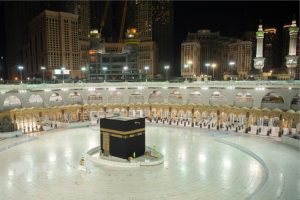Q: What should be done with the skin of the Qurbaani animal? A: One can use the skin of the Qurbaani animal for one’s personal needs. Similarly, gifting it or giving it in charity to the poor is permissible. (ويتصدق بجلدها) لأنه جزء منها (أو يعمل منه آلة تستعمل في …
Read More »Recent Posts
September, 2011
-
30 September
Distributing the meat of the Qurbaani animal
Q: What should be done with the Qurbaani meat? A: The Qurbaani meat can be consumed by oneself, family, friends, etc. It is preferable to give one third of the meat in charity. ويستحب أن يأكل من أضحيته و يطعم منها غيره و الأفضل أن يتصدق بالثلث و يتخذ الثلث …
Read More » -
30 September
Poor person’s Qurbaani animal becoming invalid for Qurbaani
Q: A poor person (upon whom Qurbaani was not waajib) purchased an animal free from any defect, but later on, its leg broke or some defect occurred which rendered it invalid for Qurbaani. Can the poor person slaughter such an animal for Qurbaani? A: The poor person can slaughter such …
Read More » -
30 September
A defect coming into the animal
Q: An animal which was free from any defect was purchased for waajib Qurbaani. Later on, before the days of Qurbaani, it’s leg broke or some defect occurred which rendered it invalid for Qurbaani. Can such an animal be slaughtered for Qurbaani? A: Such an animal cannot be slaughtered for …
Read More » -
30 September
Slaughtering an animal afflicted with mange for Qurbaani
Q: Will an animal afflicted with mange (a type of skin disease) suffice for the Qurbaani? A: If the animal is strong, it will suffice for Qurbaani. If the animal is extremely weak due to the mange, it will not suffice for Qurbaani. ولاتجزئ العجفاء التي لاتنقي (الفتاوى الهندية 5/298) …
Read More »
-
Hazrat Abu Zarr (radhiyallahu ‘anhu) moving to Shaam and Rabadhah
It was on account of Hazrat Abu Zarr Ghifaari (radhiyallahu ‘anhu) looking at Rasulullah’s (sallallahu …
Read More » -
True Achievements – The Achievements of Deen – Adherence to The Sunnah – Part 54
-
Hazrat Abu Zar’s (radhiyallahu ‘anhu) Quality of Worldly Abstinence
-
Hazrat Moulana Muhammed Yusuf Kaandhelwi (rahimahullah) – Introduction – Adherence to The Sunnah – Part 53
-
The Adherence of Hazrat Abu Zar (radhiyallahu ‘anhu) to the Instruction of Rasulullah (sallallahu ‘alaihi wasallam
-
Receiving Seventy Rewards
Hazrat Abdullah bin Amr bin Aas (radhiyallahu ‘anhuma) reported, “Whoever sends salutations upon Nabi (sallallahu ‘alaihi wasallam) once,...
Read More » -
Increase in Sustenance
-
The Reward of Fasting on the Day of Arafah
-
The Angel that Stands at the Blessed Grave of Hazrat Rasulullah (sallallahu ‘alaihi wasallam) to Convey the Durood of the Ummah
-
Reciting Durood when Entering the Musjid
-
Sunnats and Aadaab of the Guest – 4
16. The guest should not eat all the food which the host serves in the …
Read More » -
Sunnats and Aadaab of the Guest – 3
-
Sunnats and Aadaab of the Guest – 2
-
Sunnats and Aadaab of the Guest – 1
-
Sunnats and Aadaab of the Host – 6
-
Hazrat Umar bin Khattaab (radhiyallahu ‘anhu)
Hazrat Umar (radhiyallahu ‘anhu) is the second khalifah of Islam and the greatest person of …
Read More » -
Hazrat Ali (radhiyallahu ‘anhu) – Part Forty-One – Being Sent by Rasulullah (sallallahu ‘alaihi wasallam) to Level the Graves, Destroy Idols and Erase Pictures
-
Rasulullah (sallallahu ‘alaihi wasallam) Approving of the Verdict of Hazrat Ali (radhiyallahu ‘anhu) – Part Forty
-
The True Ulamaa – Hazrat Ali (radhiyallahu ‘anhu) – Part Thirty Nine
-
Du‘aa for Assistance in Settling Debts – Hazrat Ali (radhiyallahu ‘anhu) – Part Thirty Eight
 Ihyaaud Deen An Effort to Revive Deen in Totality
Ihyaaud Deen An Effort to Revive Deen in Totality



















































































